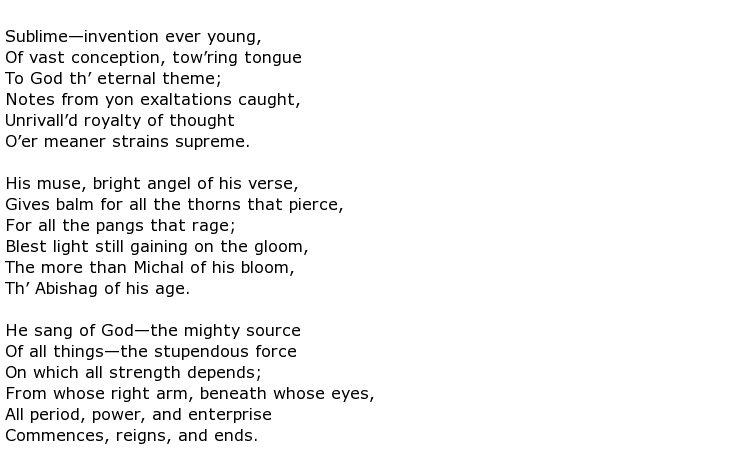 Christopher Smart was an 18th century English poet who wrote for various popular magazines using a number of pseudonyms such as “Kit Smart”, “Kitty Smart”, and “Jack Smart”, and he also adopted the persona of midwife “Mrs. Mary Midnight”. He was best known though for his high spiritual ideals, bordering on religious fanaticism at times. The fact that he was confined to mental institutions more than once suggests that his demonstrations of religious mania may have been influenced by an unbalanced mind. Indeed, his good friend Samuel Johnson noted this unorthodox behaviour and was quoted as saying:
Christopher Smart was an 18th century English poet who wrote for various popular magazines using a number of pseudonyms such as “Kit Smart”, “Kitty Smart”, and “Jack Smart”, and he also adopted the persona of midwife “Mrs. Mary Midnight”. He was best known though for his high spiritual ideals, bordering on religious fanaticism at times. The fact that he was confined to mental institutions more than once suggests that his demonstrations of religious mania may have been influenced by an unbalanced mind. Indeed, his good friend Samuel Johnson noted this unorthodox behaviour and was quoted as saying:

This was during the middle years of Smart’s relatively short life and, at the age of 34, he sought to affirm his strong beliefs with the publication of Hymn to the Supreme Being, on Recovery from a Dangerous Fit of Illness. Unfortunately this was rapidly followed by almost seven years of unbroken confinement, firstly in St. Luke’s Hospital and then in the curiously named Mr Potter’s Madhouse in Bethnal Green, North London.
Christopher Smart was born in April 1722 on a grand estate in Kent called Fairlawne which was owned by William, Viscount Vane. His father was a trusted and senior member of the Viscount’s staff and, thus, the young Christopher was treated almost like one of the family in the “big house”. He received special care, probably as a result of being born prematurely which gave him “a delicate constitution”. Christopher inherited a tidy sum of money from the Vane family and his father, Peter Smart, was able to purchase a substantial property called Hall Place nearby.
He attended schools in Kent first, such as Maidstone Grammar School, and this was his first exposure to Latin and Greek. This had to be curtailed though on the death of his father and the family moved north to Durham to live near relatives. Peter Smart had incurred huge debts and large parts of Hall Place had to be sold to cover these debts. Significantly, son Christopher was to get into similar difficulties in later life.
In his new surroundings Christopher renewed his connections with the aristocratic Vane family and wrote many poems, some dedicated to Henrietta, the Duchess of Cleveland. Once again he found himself the beneficiary of the family’s generosity and a pension that was bequeathed to him allowed him to go to Cambridge University where he attended Pembroke College. It was here that his religious fervour really took hold but this was unfortunately accompanied by reckless over spending which led to inevitable debts. He was academically successful though and wrote poems such as the trilogy Tripos Verse and others which led to an award of the “Craven scholarship for classics” in 1742. He was made a fellow of the university the following year and acquired prestigious appointments such as Praelector of Philosophy. All was going so well for Smart during his time at Pembroke but he constantly lived beyond his means.
This was exacerbated when he decamped to London after graduating from Pembroke. He was a regular drinker and soon found himself in trouble with the law over his ever-mounting debts. He was sent to debtors prison and, while there, spent his time writing poems including what most people consider his best work – Song for David. Here are the opening three verses:

The rest of his life was punctuated by more prison, more debts and he was on a seemingly unstoppable path to his own self destruction. He was incarcerated for the last time in 1770.
Christopher Smart died in prison in May 1771, aged 49. His death was recorded as natural causes.

